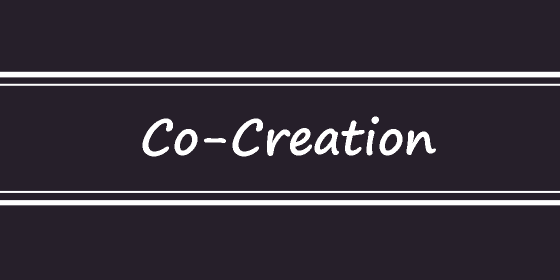Co-Creation

Co-creation is a collaborative process in which individuals or stakeholders with diverse backgrounds and perspectives work together to generate ideas, solve problems, or create innovative solutions. It involves active participation from all parties, fostering an inclusive environment where everyone’s contributions are valued and integrated into the final outcome. Co-creation can occur within a team, between teams, or involve external stakeholders, such as customers or end-users.
Key aspects of co-creation include:
- Collaboration: Co-creation emphasizes the importance of collaboration and teamwork. It brings together individuals with different expertise, experiences, and viewpoints to collectively work on a shared goal.
- Equal Participation: In a co-creation process, all participants are given an equal opportunity to contribute and shape the outcomes. The process is not dominated by any single individual or group.
- Idea Generation: Participants in a co-creation session generate ideas and solutions together. This encourages a diversity of perspectives and fosters creativity.
- Iterative Approach: Co-creation often involves multiple iterations and feedback loops. Participants build on each other’s ideas and continuously refine the solutions.
- User-Centered Focus: Co-creation often involves end-users or customers, ensuring that the final outcomes meet their needs and preferences.
- Open and Inclusive Environment: A co-creation process promotes an open and inclusive environment where participants feel comfortable expressing their thoughts and ideas.
Co-creation can be applied in various contexts, including product design, service development, business strategy, and community engagement. It is commonly used in design thinking processes, where it helps teams gain a deeper understanding of user needs, generate creative ideas, and develop user-centric solutions.
The benefits of co-creation include:
- Diverse Perspectives: Co-creation brings together diverse perspectives, leading to more robust and innovative solutions.
- Empowerment: Participants feel empowered and engaged in the decision-making process, leading to higher commitment and buy-in.
- Enhanced Creativity: The collaborative nature of co-creation stimulates creativity and fosters a culture of innovation.
- User-Centered Solutions: Involving end-users or customers ensures that the final solutions address their specific needs and pain points.
- Shared Ownership: Co-creation fosters a sense of shared ownership among participants, leading to a higher level of commitment and responsibility for the outcomes.
Overall, co-creation is a powerful approach to problem-solving and innovation, leveraging the collective intelligence of individuals to create meaningful and impactful solutions.